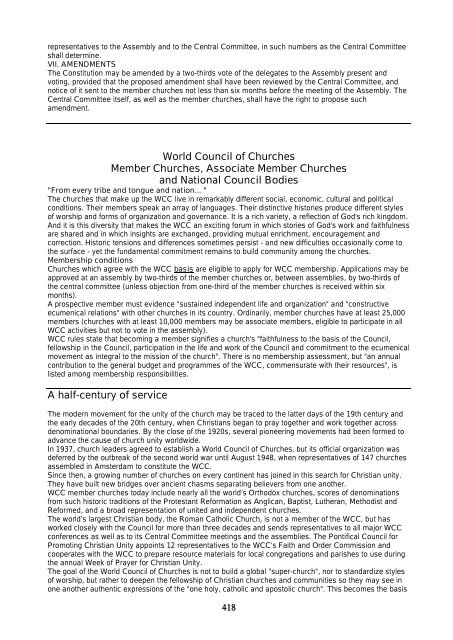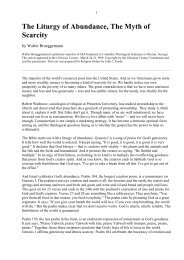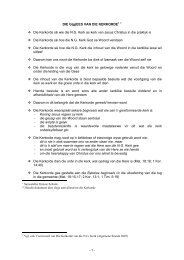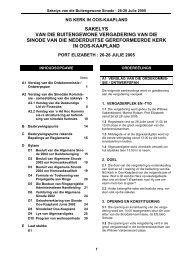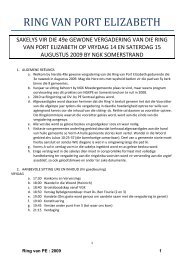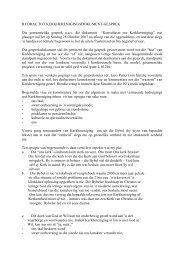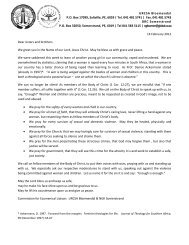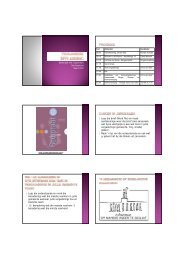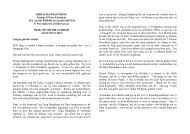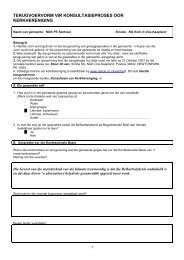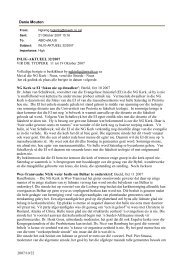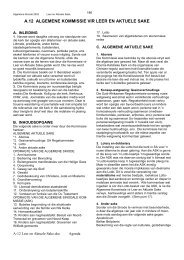- Page 1 and 2:
AGENDA DEEL I: Dokumentebundel vir
- Page 3 and 4:
VOORWOORD Die dertiende vergadering
- Page 5 and 6:
3. Kapelaansdienste................
- Page 7 and 8:
3. Kantoor en hulpbronne...........
- Page 9 and 10:
M MASA Marriage Alliance of SA N NA
- Page 11 and 12:
A.1.1 VERSLAG VAN DIE MODERAMEN: RO
- Page 13 and 14:
3.4 DIE PROSES VAN DIE SEISOEN VAN
- Page 15 and 16:
4.2 Met die oog op die uitvoering v
- Page 17 and 18:
4.11 Die Moderamen is oortuig dat d
- Page 19 and 20:
9. VERSOEKSKRIF: STEMME TEEN ONSKRI
- Page 21 and 22:
vraag is: Is daar n kampvuur waar r
- Page 23 and 24:
Die feit dat Calvyn soveel klem op
- Page 25 and 26:
Weens ons oorsprong is Gerefromeerd
- Page 27 and 28:
MODERAMEN BYLAAG 2 DIE GEESTEWÊREL
- Page 29 and 30:
dit gemeet? Mens het hier met die m
- Page 31 and 32:
oorleweringe. Ons kan egter nie agt
- Page 33 and 34:
dan die wêreld in n negatiewe verb
- Page 35 and 36:
waaragter ons nie terug kan gaan ni
- Page 37 and 38:
8.12 Dit word in psigiatrie aanvaar
- Page 39 and 40:
lewenservaring ernstig opgeneem beh
- Page 41 and 42:
waarin die Handves vir Menseregte o
- Page 43 and 44:
van die doop sal dink nie, maar ern
- Page 45 and 46:
juis op grond van sy beloftes en tr
- Page 47 and 48:
erediens die doop gou-gou afgehande
- Page 49 and 50:
A.1.2 VERSLAG VAN ALGEMENE DIENSGRO
- Page 51 and 52:
3.3 LITURGIE / HANDBOEK VIR DIE ERE
- Page 53 and 54:
GEMEENTE-ONTWIKKELING BYLAAG 1 `N A
- Page 55 and 56:
4. NUWE TESTAMENTIESE INSIGTE OOR D
- Page 57 and 58:
Dit kan ook omskryf word as die ein
- Page 59 and 60:
8.4.1 Maak seker dat die visie wat
- Page 61 and 62:
8.6.7 Oor die optimale grootte van
- Page 63 and 64:
die opsig moet die kerk die hartklo
- Page 65 and 66:
7. Bring die tug terug. Onthou ons
- Page 67 and 68:
3.2.6 Sonde-besef en sonde-belydeni
- Page 69 and 70:
Toetrede; Votum; Lof; Verwondering;
- Page 71 and 72:
GEMEENTE-ONTWIKKELING BYLAAG 3B ERE
- Page 73 and 74:
BYLAE 1 STUDIESTUK: RITUEEL EN SIMB
- Page 75 and 76:
waarin verandering en transformasie
- Page 77 and 78:
GEMEENTE-ONTWIKKELING BYLAAG 4 BEDI
- Page 79 and 80:
Versoening Herstel Bevryding: geest
- Page 81 and 82:
3.8 STATISTIEK Die statistiek verte
- Page 83 and 84:
gemeente (Chicago, VSA) juis agv bg
- Page 85 and 86:
4. AFSTIGTING, SAMESMELTING, SLUITI
- Page 87 and 88:
1.2 WANNEER MEER AS EEN GEMEENTE EN
- Page 89 and 90:
3.1.7 n Afskrif van die ooreenkoms
- Page 91 and 92:
A.1.3 VERSLAG VAN DIE ALGEMENE DIEN
- Page 93 and 94:
DIENS EN GETUIENIS, DIE WESENSTAAK
- Page 95 and 96:
A.1.4 VERSLAG VAN DIE ALGEMENE DIEN
- Page 97 and 98:
3.1 INLEIDING Om werklik relevant t
- Page 99 and 100:
A.2 OPENBARE GETUIENIS Á
- Page 101 and 102:
2.1.2.2 Die beginsels waarvolgens h
- Page 103 and 104:
3.4 Die Moderamen beskik egter nie
- Page 105 and 106:
staat reeds bepaalde regte aan gay-
- Page 107 and 108:
Vir ons as Moderamen in n nuwe land
- Page 109 and 110:
5. MISDAAD EN GEWELD 5.1 Hierdie sa
- Page 111 and 112:
We therefore urge the President as
- Page 113 and 114:
3.5 Die Moderamen gee opdrag aan n
- Page 115 and 116:
*4 Lidmate, maar ook die breë publ
- Page 117 and 118:
kommunikasievaardighede van voornem
- Page 119 and 120:
*2 Uitsaaityd en die koste aan die
- Page 121 and 122:
14.6 Die Sinode onderskryf die Hand
- Page 123 and 124:
KERK/STAAT DIAGRAM Met klem op die
- Page 125 and 126:
A.2.3 VERSLAG VAN DIE ALGEMENE DIEN
- Page 127 and 128:
2.1 MEMA-MEDIA Die behoefte aan ele
- Page 129 and 130:
26 548 (teenoor 26 536 in 2006 - ve
- Page 131 and 132:
Donasies Ontvang 10,500,000 Diverse
- Page 133 and 134:
Mediaprojekte: Ander Buitelandse Pr
- Page 135 and 136:
A.3.1 VERSLAG VAN DIE MODERAMEN: BE
- Page 137 and 138:
2. Dr Bartlett het geen probleem da
- Page 139 and 140:
aanvanklike sendingbetrokkenheid. D
- Page 141 and 142:
en daad Christus aan die wereld te
- Page 143 and 144:
1.7 FOKUSAREAS Terwyl die taakgroep
- Page 145 and 146:
Bo 35: 51 Onder 35: 3 Geen gestremd
- Page 147 and 148:
1. Manlike dominansie of patriargal
- Page 149 and 150:
MODERAMEN BYLAAG 2 VERSLAG VAN TAAK
- Page 151 and 152:
4. MENINGSVERSKILLE Daar is besluit
- Page 153 and 154:
afdoende besluite binne n kort tyd
- Page 155 and 156:
2 BEOORDELING VAN BYBELSE GEGEWENS
- Page 157 and 158:
wat van hulle geboorte so is , ande
- Page 159 and 160:
Noukeurige ontleding van die teks d
- Page 161 and 162:
seksuele wangedrag in die algemeen,
- Page 163 and 164:
afwesigheid van die moontlikheid va
- Page 165 and 166:
sodanige terapieë het op die meest
- Page 167 and 168:
Volgens die Bybel word seksualiteit
- Page 169 and 170:
5.4 PRAKTIESE RIGLYNE VIR PASTORALE
- Page 171 and 172:
BRONNELYS Algemene Sinode 1986. Age
- Page 173 and 174:
BYLAAG 2 HOMOSEKSUALITEIT 1. SAMEVA
- Page 175 and 176:
aktiewe deelnemer net soos die pass
- Page 177 and 178:
Skrifgeleerdes sou gekry het. Die N
- Page 179 and 180:
espek vir die ander, aanvaarding en
- Page 181 and 182:
4.2.1.2 Jesus se inklusiewe bedieni
- Page 183 and 184:
Sekere Ou-Testamentiese Skrifwaarhe
- Page 185 and 186:
om by die hedendaagse denkwyse aan
- Page 187 and 188:
º ª ¥ ºøøÆø µß º ¨ ø
- Page 189 and 190:
Indien die handhawing van die gesla
- Page 191 and 192:
n Duidelike aanduiding dat die etie
- Page 193 and 194:
‘ª ÔËÊÓÓ ª Ó ÊÔÌ ø ª
- Page 195 and 196:
Om egter, soos Hester voorstel, in
- Page 197 and 198:
egin deur nie eers, soos gebruiklik
- Page 199 and 200:
n Rabbynse kommentaar op Lev 18:3vv
- Page 201 and 202:
kultuur negatief geoordeel is, 24 e
- Page 203 and 204:
malakoi "means 'licentious'" (Germo
- Page 205 and 206:
Evaluering van die keuse-teen-God a
- Page 207 and 208:
heidene af (vers 23). Die homoseksu
- Page 209 and 210:
gedrag ritueel onrein is vir Joodse
- Page 211 and 212:
Die ander argument dat die Bybel ni
- Page 213 and 214:
5.2. n Kanonieke hermeneutiek Hoewe
- Page 215 and 216:
vanselfsprekend aanvaar word dat he
- Page 217 and 218:
afskaffing van slawerny as sulks ge
- Page 219 and 220:
After some time I saw her bathing i
- Page 221 and 222:
Met hierdie gedeelte word die getui
- Page 223 and 224:
Die belangrike punt hier is dat bai
- Page 225 and 226:
Gedrag is een van die mees kompleks
- Page 227 and 228:
Hierdie navorsing van Hamer en koll
- Page 229 and 230:
Dit word opgevolg deur die besluit
- Page 231 and 232:
Die Skrif (waardes en norme) Die in
- Page 233 and 234:
groepsverband dat God grense gee. D
- Page 235 and 236:
Aristotoles 2000 (2002). Nicomachea
- Page 237 and 238:
Griffiths, P D et al 1974. Homosexu
- Page 239 and 240:
Rijsdijk FV & Sham PC 2002. Analyti
- Page 241 and 242:
MODERAMEN BYLAAG 3 ROEPING KEURING
- Page 243 and 244:
daaroor sal waak. Omgekeerd is die
- Page 245 and 246:
9.9 die uitoefening, saam met die o
- Page 247 and 248:
* In die geval van die funksie van
- Page 249 and 250:
4. AANMELDING EN KEURING HOOFSTUK 4
- Page 251 and 252:
neem die kuratorium sodanige studen
- Page 253 and 254:
waarde daarvan vir hulle veral saam
- Page 255 and 256:
In sommige gevalle kan dit beteken
- Page 257 and 258:
5.4.4 n Geïntegreerde program van
- Page 259 and 260:
In die algemeen moet opgemerk word
- Page 261 and 262:
n Verkleinde maar effektiewe sentra
- Page 263 and 264:
Predikante beklee die amp soos omsk
- Page 265 and 266:
(1) Die student se roeping (2) n Pe
- Page 267 and 268:
HOOFSTUK 7 7. VERKRYGING, BEHOUD, V
- Page 269 and 270:
ol speel. Voortgesette Bedienings O
- Page 271 and 272:
om in hierdie beroep akkreditering
- Page 273 and 274:
9. DIENSVERHOUDINGE HOOFSTUK 9 9.1
- Page 275 and 276:
10. MOBILITEIT HOOFSTUK 10 10.1 INL
- Page 277 and 278:
Hoewel een of meer van die kollegas
- Page 279 and 280:
Daar moet daarteen gewaak word om n
- Page 281 and 282:
11.1.3 Besluite van die Algemene SI
- Page 283 and 284:
Emeriti kan deur die uitstuur van a
- Page 285 and 286:
1.5 n Persoon kwalifiseer as predik
- Page 287 and 288:
studie] en ring(e). 4.4.3.10 die fi
- Page 289 and 290:
7.3.1.2 wanneer die vereistes vir d
- Page 291 and 292:
11.1.2 Na aftrede behou die predika
- Page 293 and 294:
A.3.2 VERSLAG VAN DIE ALGEMENE DIEN
- Page 295 and 296:
2. LIDMAATBEMAGTIGING (Vgl ADGO Byl
- Page 297 and 298:
eietydse wyse, en terug te rapporte
- Page 299 and 300:
GEMEENTE-ONTWIKKELING BYLAAG 1 JONK
- Page 301 and 302:
8.3.3 Die nuutverkose Jonk Taakspan
- Page 303 and 304:
drie jaar aangebied en bied n gehee
- Page 305 and 306:
2.5 Artikels oor Lidmaatbemagtiging
- Page 307 and 308:
aan wat beweer: It is hard to get p
- Page 309 and 310:
Selfs in die kleinste gemeente moet
- Page 311 and 312:
5.Jy ontdek jou gawes deur die bedi
- Page 313 and 314:
1.2.4 Alhoewel die reformasie klem
- Page 315 and 316:
GEMEENTE-ONTWIKKELING BYLAAG 3 PRED
- Page 317 and 318:
Die Taakgroep Predikantebegeleiding
- Page 319 and 320:
GEMEENTE-ONTWIKKELING BYLAAG 4 ALGE
- Page 321 and 322:
GEMEENTE-ONTWIKKELING BYLAAG 5 BESL
- Page 323 and 324:
4.2.4 n Laaste opmerking oor die ge
- Page 325 and 326:
GEMEENTE-ONTWIKKELING BYLAAG 7 KLEI
- Page 327 and 328:
GEMEENTE-ONTWIKKELING BYLAAG 8 KERK
- Page 329 and 330:
GEMEENTE-ONTWIKKELING BYLAAG 10 AAN
- Page 331 and 332:
GEMEENTE-ONTWIKKELING BYLAAG 11 GEM
- Page 333 and 334:
A.3.3 VERSLAG VAN DIE ALGEMENE DIEN
- Page 335 and 336:
kan toetree, bly dit egter steeds m
- Page 337 and 338:
liggaam wat deur die Algemene Sinod
- Page 339 and 340:
hanteer het, is daar nie n reg tot
- Page 341 and 342:
7 Besluit dat die AT die verantwoor
- Page 343 and 344:
2.1.5 Die ST wys uit eie geledere n
- Page 345 and 346:
2.7.2 In sy besluit, of indien die
- Page 347 and 348:
*2 Onsedelike optrede soos pedofili
- Page 349 and 350:
*5 Die ADGO-dagbestuur het op 1 Sep
- Page 351 and 352:
7.2 AANBEVELING: AFSTIGTING EN NUWE
- Page 353 and 354:
13. BESLUIT VAN DIE RING VAN CRADOC
- Page 355 and 356:
die gesprek oor teologiese opleidin
- Page 357 and 358:
4.2 AANBEVELING: PROFIEL VAN GELEGI
- Page 359 and 360:
Transparency; Punctuality; Time man
- Page 361 and 362:
AKTO was by die vorige Algemene Sin
- Page 363 and 364:
jaar (B Th + M Div) as probleembewu
- Page 365 and 366:
akademiese en professionele krediet
- Page 367 and 368:
A.4 NOOD EN GENESING ÌÎË
- Page 369 and 370:
MODERAMEN BYLAAG 1 PROFESIE OOR PRO
- Page 371 and 372:
In die verlede het teologiese stude
- Page 373 and 374:
25:31-46, die hele Matt 23 (Jesus s
- Page 375 and 376: 5.2.2 Peoples Budget Campaign: BIG
- Page 377 and 378: * unrestrained competition, consume
- Page 379 and 380: die aantal armes en werkloses in di
- Page 381 and 382: 10. This is an ideology that claims
- Page 383 and 384: 39. The General Council calls upon
- Page 385 and 386: se roeping in die Suider-Afrika kon
- Page 387 and 388: * advies en steun met betrekking to
- Page 389 and 390: geposisioneer moet wees, aangesien
- Page 391 and 392: A.5.1 VERSLAG VAN DIE MODERAMEN: VE
- Page 393 and 394: 12. Raadpleging van gemeentes Hoewe
- Page 395 and 396: 1. The GSC declares unambiguously i
- Page 397 and 398: 3.2.6 The General Synod decides not
- Page 399 and 400: BYLAAG A BESLUIT VAN DIE VERENIGEND
- Page 401 and 402: VERBONDSVERBINTENIS TOT HERENIGING
- Page 403 and 404: tussen die moderators en skribas aa
- Page 405 and 406: aanduidings is positief tov moontli
- Page 407 and 408: Die aanbevelings oor die kerkhereni
- Page 409 and 410: n goeie voorbeeld hiervan. Met sy v
- Page 411 and 412: 4.2.1 There is a need to create a n
- Page 413 and 414: *3 Die dokumentasie vir die aandag
- Page 415 and 416: die Sentrale Komitee verteenwoordig
- Page 417 and 418: 3.5.3 Dutch Reformed Church in Sri
- Page 419 and 420: MODERAMEN BYLAAG 1 ALL AFRICA CONFE
- Page 421 and 422: GOVERNANCE STRUCTURE The General As
- Page 423 and 424: This communion embodies the Reforme
- Page 425: MODERAMEN BYLAAG 3 World Council of
- Page 429 and 430: MODERAMEN BYLAAG 4 Towards a Common
- Page 431 and 432: to emerge from former colonies are
- Page 433 and 434: It is important to insist that the
- Page 435 and 436: 3.5.2 The essence of the Council is
- Page 437 and 438: 3.12. 1recognize the essential iden
- Page 439 and 440: 4.5 In 1992 the WCC Central Committ
- Page 441 and 442: A.5.2 VERSLAG VAN ALGEMENE DIENSGRO
- Page 443 and 444: Gemeentes van die NG kerk word opnu
- Page 445 and 446: WERKSAAMHEDE CLF se lektuur het ook
- Page 447 and 448: DIENS EN GETUIENIS BYLAAG 2 VERSLAG
- Page 449 and 450: DIENS EN GETUIENIS BYLAAG 3 VERSLAG
- Page 451 and 452: By Unisa se gradeplegtighede gedure
- Page 453 and 454: A.6 BESTUUR, ADMINISTRASIE EN NAVOR
- Page 455 and 456: 1.4 die Moderamen hanteer slegs die
- Page 457 and 458: prioriteite na vore kom, die verant
- Page 459 and 460: REGLEMENT ALGEMENE DIENSGROEP GEMEE
- Page 461 and 462: 4.4 Leierskapvraelys die vraelys lo
- Page 463 and 464: 5.2.2 Die Dagbestuur is verantwoord
- Page 465 and 466: * om mee te werk aan die hereniging
- Page 467 and 468: A.6.4 VERSLAG VAN DIE ALGEMENE DIEN
- Page 469 and 470: Enige van die regsentiteite van die
- Page 471 and 472: aanbeveel: ADGO; ADG; ADO; ADD; Ver
- Page 473 and 474: hulle te help met die voorberei van
- Page 475 and 476: 4.3.5.5 Voordele vir die NG Kerk 4.
- Page 477 and 478:
5.7.1 bepaal behoeftes ten opsigte
- Page 479 and 480:
4.1.3.1.4 alle oorspronklike versla
- Page 481 and 482:
1.4.2 alle aanwinste sover moontlik
- Page 483 and 484:
2.3.2 Vereiste bewysstukke/stawende
- Page 485 and 486:
van dooplidmaatskap uit wat aan die
- Page 487 and 488:
4.7 Onopspoorbare bewys van lidmaat
- Page 489 and 490:
A.6.4.4 ALGEMENE TAAKSPAN FONDSE 1.
- Page 491 and 492:
GEMEENTEONTWIKKELING 896,600 1,172,
- Page 493 and 494:
Artikel 43 Tot die taak van die Alg
- Page 495 and 496:
Noord-Kaapland ds FD Hugo NG Kerk i
- Page 497 and 498:
die Algemene Sinode of ASM gedoen.
- Page 499 and 500:
3. BELEGGINGSBELEID EN STRATEGIE 3.
- Page 501 and 502:
Drie: Kapitaal Gewaarborgde Beleggi
- Page 503 and 504:
B. BESKRYWINGSPUNTE ÏÁÏ
- Page 505 and 506:
1. Ons stel voor dat die 4 kerke va


